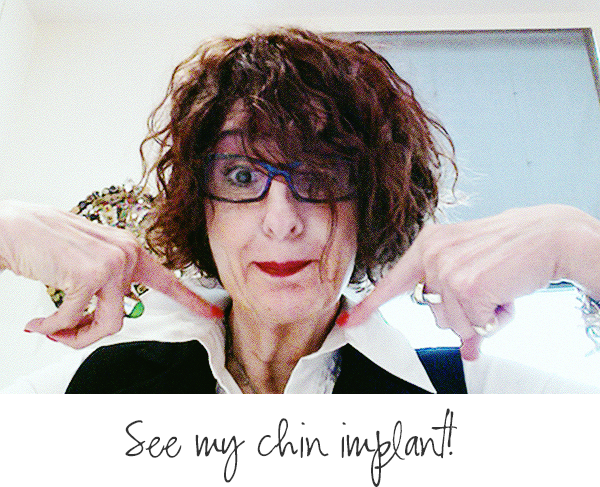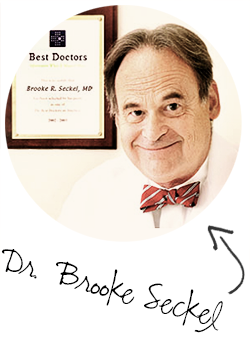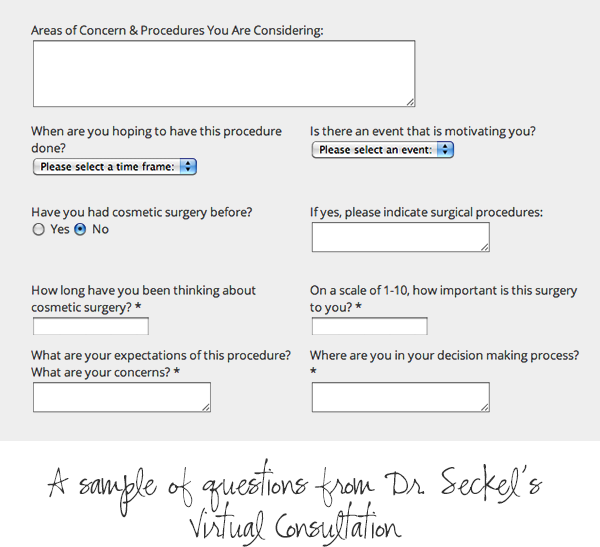
I’ve visited a psychic, figuring what did I have to lose (It was fun!). I tasted live teeny tiny snails in Paris (They were delicious!). I made out with a devilishly handsome stranger on a flight from Atlanta to New York when was I was 41 (We were together for 12 years, until he died 14 years ago!). And I interviewed for a big job when I was 8 months pregnant (It was 1981 and I positioned lots of bags in front of me to hide my physical state.).
Although I haven’t gone sky diving or climbed Mount Everest and refuse to eat soft-boiled eggs (my mother practically forced them down my throat in the fifties), I like stepping out of my comfort zone, even if it’s not always very comfortable. Sometimes, it’s even downright idiotic.
Having liposuction on my jowls (they were getting pretty nasty looking); a chin implant (I was almost as chinless as fifties gossip columnist, Dorothy Kilgallen); some work done on my upper eyelids (the droopiness made me look sad and tired) and Ultherapy (lax skin looks, well, lax) were some of the best  step-out-of-my-comfort-zone-moves I ever made.
step-out-of-my-comfort-zone-moves I ever made.
Although I enthusiastically recommend plastic surgery, I recognize that many of my FOFriends are A) nervous about B) against or C) can’t afford it. Despite their concerns, I still believe it’s a mighty interesting exercise to at least have a consultation with a world class, board certified surgeon and hear what he or she has to say.
I recently had a conversation with Dr. Brooke Seckel, whose practice, Boston Plastic Surgery Specialists, is located in Concord and Boston, MA. He has 32 years experience, teaches, launched a residency program in the field and talks about his work with passion and intelligence. You can have a painless, quick, convenient—and gratis—Virtual Consultation  with Dr. Seckel by clicking here, but first, read my Q&A with him for a bit of insight into his philosophy.
with Dr. Seckel by clicking here, but first, read my Q&A with him for a bit of insight into his philosophy.
What exactly is a Virtual Consultation?
The Virtual Consultation is handled through email. I’m not yet at the stage where I use a video camera and conferencing that let me see and talk with a patient, although that will be a logical evolution of what I’m now doing. However, my Virtual Consultations still give me the opportunities to communicate with patients with whom I normally might not otherwise have communicated.
I started these consultations about five years ago, when I began to get inquiries on my website from potential patients who lived out of state and even in Europe and India. I’d ask them to send me photographs and to tell me exactly what troubles them and I’d let them know if it was worth it for them to meet with me in person. It’s expensive to come from out of town, especially if someone is not even a candidate for plastic surgery. I still insist patients come for in-person consultations. I do not book surgery based on a Virtual Consultation.
How many Virtual Consults do you do in a typical week and how much time do you spend on each?
I certainly get at least one VC form a day; some days I’ll get three. The Virtual Consult gives a patient the opportunity to describe exactly what’s bothering her and to send me photos. It also can save someone the time and expense of a trip if she’s not a good candidate for surgery.
Based on the photographs, I can say, ‘Come and see me. I think you may be a candidate.’ Patients really seem to like it.
I usually spend 20 to 30 minutes reading, analyzing, sometimes consulting my associate for an opinion about a particularly challenging problem, finding proper content to send back to the patient, and writing the email.

Besides responding to the form they submit, do you give the potential patient anything else?
I’ve been writing informative, high-quality web content for six years so I have an excellent backlog of information to send potential patients. If someone wants a breast augmentation, for example, I’ll respond to her and will include links to articles on how to choose breast size, whether to use silicone or saline, textured or smooth implants. My goal is to educate patients before they ever show up at the office. If there’s anything really worrying a patient, it usually comes out in the Virtual Consult.
It’s just horrific how much misleading information is available on the Internet in our extremely competitive field. Some websites invent names for procedures to make you think they’re gentle and non-surgical procedure, when, in fact, they’re not. But there also is good content out there if you know which sites are reputable.
Besides the issues you address through the VC, what important characteristics should someone look for in a plastic surgeon?

Honesty, professionalism and patience. Surveys have revealed that price doesn’t come up till later in the decision process. Choosing a plastic surgeon is a personal experience. Patients also report that they’re not looking for flashy, fancy dressers or offices.
It’s imperative to ask if a doctor board certified, whether he or she belongs to the American Society of Plastic Surgery (ASPS) and how much experience he has.
Trust your gut feelings. Each one of us has a subconscious sense when we meet someone: ‘Do I trust him? Do I feel safe and comfortable here?’
You can also take recommendations from friends and relatives. But it’s face-to-face interaction with the doctor that counts most.
What about reviews?
There’s been a lot of controversy about fake reviews. Some doctors buy reviews, too. Fortunately, Google will not accept a review if it’s written from the surgeon’s computer. A review must be sent from a patient’s own computer.
How much importance should a woman place on the locale of the doctor?
It’s pretty important that you have access to your doctor after you’ve had a complex surgical procedure. There are people who go to the Dominican Republic and then have great complications.  Their local surgeons are offended that they went there, so they’re reluctant to see the patient once there are problems.
Their local surgeons are offended that they went there, so they’re reluctant to see the patient once there are problems.
I perform a fairly unique procedure to correct dark circles under the eyes, so people come from overseas for it. About 20 percent to 30 percent of my patients are from out of state or out of the country. I tell them, right upfront, that they need to stay local and can’t fly for 10 days. I see them on days 1, 3, 5, and 7, following surgery, and then at day 10. I’m comfortable with a patient driving or taking a train after 5 days, If there’s no unusual swelling, vision is fine, and a patient is reliable, but they still can’t fly.
Flying is risky after complicated, multiple procedures. The risk of blood clots in the calf—which can lead to pulmonary embolisms—is very high immediately after any kind of surgery when you’re put to sleep and lying down on a table. If you’re already at risk and get into negative pressure cabin on a plane, you could get dependent pooling of your blood.
What do you say to a woman who absolutely wants plastic surgery, but can’t afford it? Should she just forget about it?
Absolutely not. Mass General, for example, a renowned hospital in Boston, has a clinic where world class plastic surgeons supervise the Fellows who are almost at the end of their training. Fellows will perform the surgeries with their ‘attending doctors,’ who must be in the operating room. So you have the advantage of a leading surgeon being in the operating room, without having to pay steep fees. Most major cities have programs such as this. Call the Department of Plastic Surgery at the leading hospital near you and find out if they have a Resident’s Clinic.


One Response to “Setting Up A ‘Virtual Date’ with a Harvard-Trained, Board-Certified Plastic Surgeon”
Michelle Christie says:
Very nice article informative content thanks we liked it.